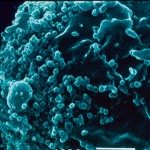Link to Pubmed [PMID] – 7521361
J. Immunol. 1994 Sep;153(6):2444-56
In addition to the TCR-CD3 complex, T lymphocytes can be activated via another surface glycoprotein, the CD2 molecule. CD58 is the principal ligand for human CD2; CD59 and CD48 are two additional, low affinity ligands that have been defined for CD2. In this study, we have explored the role of CD59 in T cell activation. We have expressed human rCD58 and rCD59 molecules in Chinese hamster oocytes (CHO), and tested paraformaldehyde-treated transfectants for the ability to promote proliferation of and IL-2 secretion from PBMC and human purified T cells. We have shown that CD59 enhanced CD58-dependent T cell proliferation and IL-2 secretion in the presence of suboptimal concentration of PHA or a submitogenic combination of stimulatory anti-CD2 mAbs, presence of suboptimal concentration of PHA or a submitogenic combination of stimulatory anti-CD2 mAbs, T11-2 + T11-3. CD59-dependent costimulation was dependent on several factors including the level of co-expression of CD58, the ratio of CHO cell transfectants to T cells added in culture, the concentration of mitogen, and also donor-dependent differences. As expected, CD59 costimulation of CD58-dependent T cell proliferation was inhibited by Abs directed against CD59, CD58, and CD2. In our hands, the CD59 molecule itself, in the absence of CD58, was unable to support proliferation alone even in the presence of exogenous recombinant IL-1, IL-2, or IL-6. Finally, the ability of CD59 to enhance CD58-dependent T cell responses was shown to be dependent on N-glycosylation of CD59 at amino acid Asn18.

